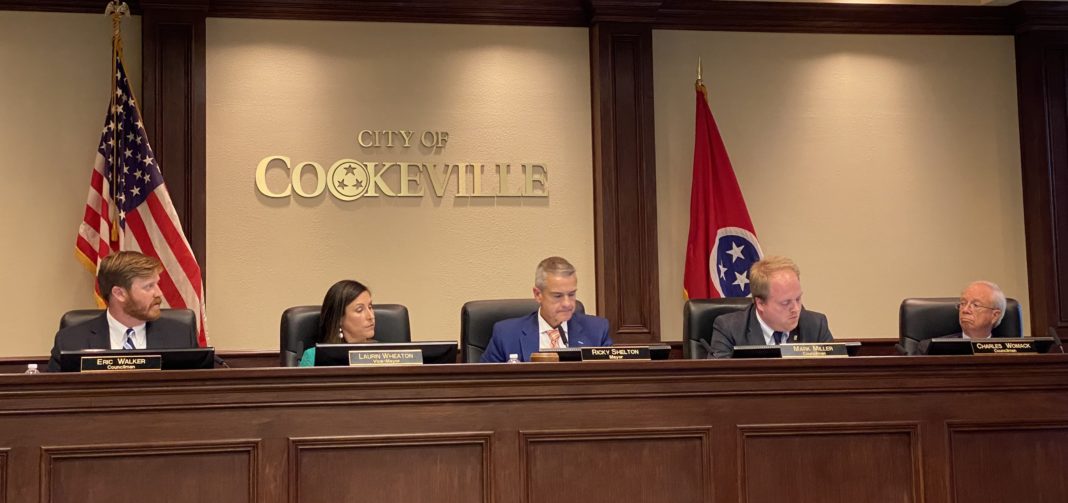By Michelle Price
Special to the UCBJ
COOKEVILLE – Despite still having some unresolved concerns, the Cookeville City Council unanimously passed the Cookeville Regional Medical Center (CRMC) FY22 budget Thursday evening on first reading. The budget must be approved on second reading before it becomes official. The second reading is scheduled for Thursday, June 17 during the regularly scheduled city council meeting.
“I think it’s important that we do fund the hospital this year,” said Councilman Eric Walker as he encouraged his fellow council members to pass the budget. “That being said, I do think there are some concerns. There are clearly concerns from other council members and the public. There were some mistakes that caused them to look closer at the budget and our fiduciary responsibility.”
CRMC CEO Paul Korth presented the CRMC budget overview for the council prior to the opening of the public hearing on the budget. He explained that capital projects planned for next year include $1.9 million for a new surgical da Vinci robot, $1.9 million for a new phone system and the 5W/4W renovation that includes 24 new med/surgical beds and 16 new ICU beds. Staff will also receive a 3% salary increase across the board.
Korth acknowledged that administrative salaries have been questioned recently but shared that the administrative salaries budget is actually down $300,000 from the 2016 budget. Over that time period, two vice-presidents retired and were not replaced. They also had two vice-presidents that took other positions. One was the chief operating officer, and one was the chief financial officer. Those two critical positions were replaced.
“This year’s budget does include a 3% increase for administration department just like all the other departments at the hospital,” said Korth. “The salaries for the C-suite are determined using surveys from two large national databanks. We use a national database called (Willis) Towers and Watson and SullivanCotter. Both of those surveys will show that the C-suite salaries are between the 21st and 27th percentile of those nationally compared to hospitals our size.
“My salary is 25% of that national ranking, that would mean that 75% of those CEOs in that $150-400 million operating range make more than I do. So, I can assure you that our salaries, being in that 21-27 percentile, rank very favorable in relation to any other hospital in the United States,” Korth said.
Korth also shared that the operating budget for the administrative department, including the seven members of the C-suite, has salaries and wages totaling $2.6 million total.
CRMC Board of Trustees Chairman Allen Ray added, “The budget that was presented to you was approved by the board without dissent. I would encourage you to vote for this budget. I think it was well done. It is what the hospital needs, and it will allow us to provide quality care to our patients.”
Councilman Chuck Womack, MD, agreed that salaries and stories of salaries was a key issue for him.
“A lot of people have called me,” Womack stated. “We’ve got stories about salaries that are high, quite high…the fact that we have these salaries and stories of salaries and doctors are not being given contracts and being forced out is a bad thing. We need to work with the board of trustees. I think that the situation is not as good as it’s being portrayed.”
Womack proposed an amendment to the budget ordinance making the budget’s passing contingent on CRMC supplying the salary numbers of its seven chief officers. That includes the chief executive officer, the chief operating officer, the chief information officer, the chief strategy officer, the chief legal officer, the chief financial officer and the chief nursing officer. Council Member Mark Miller seconded the motion.
Walker asked about the effects of the possible passage of the amendment relative to the first reading of the ordinance.
City Attorney Dan Rader explained that the amendment was a “material or significant” amendment and if passed, the contingencies would have to be completed before the council could consider the budget on first reading.
This would mean that the ordinance would be held until the council received the salary numbers from CRMC’s Board of Trustees. The Board of Trustees would have to vote on whether to provide that information to the council at their meeting later this month, ensuring that the budget couldn’t be brought back to the council for the first of two readings before the July 1 Council meeting.
Rader said the proposed amendment, which ultimately failed by a 2-2 vote, again moved the council into operational issues.
“Where are our fiduciary responsibilities of the city council then if we can’t understand the operations of the hospital,” asked Miller. “Why are we voting on this budget?”
“You are voting on the budget because the Private Act requires you to vote on the budget and the city charter requires you to vote on the budget,” Rader said. “But the question is ‘where is your authority in relation to the management and operation of the hospital?’ That’s where you choose the trustees and rely on them to make those management and operational decisions.
“They do that. Just like this council hires Mr. Mills (city administrator), the Board of Trustees of hospital hires Mr. Korth and then he makes the employment decisions. That’s the chain of command under the legalities of the Private Act. The City Council does not own, operate and manage the hospital.”
Vice-Mayor Laurin Wheaton, a nurse practitioner whose patients utilize CRMC, emphasized the importance of the facility and the lifesaving care it gives, while acknowledging that problems do exist.
“I have worked at the University of Mississippi medical center; I have worked at Vanderbilt,” she said. “Those hospitals have problems too. Every hospital has problems. If you don’t think they do, then go work in the hospital.
“There are issues we need to address, but if we don’t vote on the budget and we don’t pass it, we’re stalling ourselves on having that conversation. These are conversations that can be had in a civilized adult manner without holding the budget “hostage,” and I don’t want to use that word and that phrase, but we are down to the wire now.”
Mayor Ricky Shelton spoke as mayor and said, “Obviously, we all understand the importance of CRMC. It’s one of the most important assets we have in Cookeville and the entire region. It definitely attracts industry to our region. It is a determining factor in new companies and jobs locating here. They’ve told us that.”
Miller added that he is worried because the council only has one or two votes on the entire hospital. He said, “We get a hospital trustee, and we get to vote on the budget, so if there is an issue, we have to work it out before the budget. I feel like I’ve been stonewalled the entire time. When I asked questions. I asked about multiple things, I feel like I get legalese, and were not getting actual answers to questions.”
Wheaton agreed, but with a caveat, “There are issues that we need to discuss with the hospital, and I know we can move forward with having these discussions, and we can gain the trust back from the community. We’ve got to pass the budget first.”









